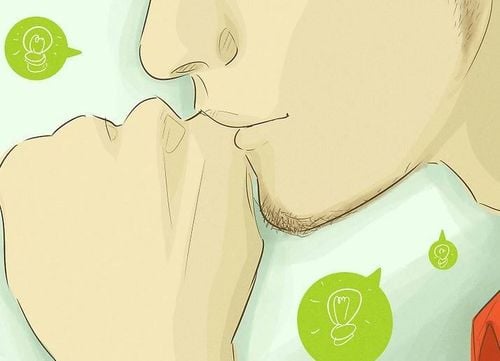This is an automatically translated article.
A healthy mind is just as important as a healthy body, but sometimes we can forget how important it is to form habits that can improve your mental health. Read more below to learn about easy habits that can improve your mental health.
1. Why take care of your mental health?
Our lives are often busy and full of stress day in and day out. If you've ever experienced a time of high anxiety, you know how it can affect not only your physical health, but also your mental health. Finding ways to keep yourself calm and relaxed can help prevent stress from taking over your life.
We all understand that we should eat well and get plenty of exercise, but what can we do to ensure that we are mentally strong, resilient and content with physical health , as well as improve mental health and know how to take care of mental health.
Today, when society is more and more developed, material life is increasingly improved and enhanced, along with it will also be an increase in metabolic cardiovascular diseases, bone and joint diseases ... Besides, , mental illnesses are also being discovered more and more day by day. In particular, currently the impacts of the COVID-19 pandemic have caused serious impacts on the mental health of millions of people around the world. Originating from anxiety, fear, loneliness, social isolation, the stress status of people with mental illness worsens when the epidemic is not under control and they are still looking for solutions to prevent the disease. Translate..
2. Easy Habits That Can Improve Your Mental Health
When it comes to self-improvement, sometimes we can get caught up in the big picture. We say we want to be "happy" or "healthy" but we often forget that making small changes to our daily routine is what can really help us get there. .
The following are helpful habits that will make it easy to achieve good mental health:
2.1. Get some rest Sleep is extremely important. We spend about a third of our lives in bed and sleep is just as important as eating and breathing. Just a few days without a good night's sleep can have a huge impact on your emotions, memory, and critical thinking abilities. But in reality, it is more important that these issues be addressed and understood, as they can often occur, both as a contributing factor and as a side effect of mental illness.
Make sure you have an established sleep schedule and get enough sleep. Go to bed at a set time and this means no televisions or cell phones! In fact, it's probably best to keep screens out of the room if possible and only go to bed when you intend to sleep. Your brain has an amazing ability to make connections. Make sure your bedroom is comfortable and free of distractions. If you can't sleep, pick up a book and read for a while instead of scrolling through Facebook!
2.2. Think Positive Try to start the day on a positive note! At times when we feel low, positivity can feel like an impossible task. However, there's loads of evidence to show that thinking positively can have a big impact on your mood, make you feel more positive, boost your mental health even more! It's a wonderful, happy cycle, and we should do everything we can to get ourselves into it.

Suy nghĩ tích cực có thể giúp bạn cải thiện sức khỏe tinh thần
2.3. Start Small Every morning, tell yourself that today is going to be a good day. When something good happens, pay attention to it! We all remember the bad and forget the good, so try to pay special attention to the good things in your life, even if they are just the little things. A random encounter with a stranger that makes you smile, a particularly delicious sandwich, even something as small as washing your face, pay attention to them and remind yourself that good things are always there. exist.
2.4. Exercise and eat right Sometimes something as simple as a quick walk can make all the difference. It may sound cliché, but the saying 'healthy body, healthy mind' is absolutely true! We are biological machines and if we use the wrong fuel or let our joints rust, everything else will suffer. You don't have to enter an eating contest, or just eat protein powders and broccoli. Start by getting outside and moving around, even if it's just for 10 minutes a day. Just exercising and breathing fresh air can have a huge impact. Trying to make sure you eat green foods at every meal, avoid junk food, cut down on starches and sugars, might consider improving your cooking skills.
2.5. Give yourself a break We live in a fast-paced and stressful world. Social media and the internet mean we get our information quickly, we're always on the go, absorbing information and responding emotionally. This is great in a way, we're more connected than ever, we can communicate with friends and family wherever they are. But it can also cause stress, anxiety, a feeling of fatigue, and a huge amount of pressure that is always present in your mind.
Practice some self-care and make sure you take some time for yourself. Go out into nature and spend time away from screens, trying to reduce the time you spend on social media.
2.6. Pick a hobby Learning to play an instrument is a great creative outlet. One of the best ways to maintain a healthy mind is to keep your brain active and busy. If you already have a hobby, try to make sure you keep it up. One of the first things we tend to do when we feel depressed is to stop doing things that once made us happy, and it's important that you avoid that if you can. If you've lost track of your hobby, don't worry, just try to take some small steps to start over. Or maybe consider something completely new! It could be anything from sewing to fishing, polishing to stamp collecting, anything that interests you and gives you something to focus on positively.
The Internet is a resource for gathering information about new interests. Some of them may even have local organizations or clubs that you can join. Don't worry if this doesn't appeal to you, there are plenty of hobbies you can make yourself, if that suits your style.

Hãy lựa chọn một sở thích để có thể cải thiện sức khỏe tinh thần
2.7. Be mindful Take time to stop and re-evaluate your surroundings. Mindfulness is a technique that teaches you to try and focus on how you are feeling in the moment and pay attention to physical sensations and emotional responses.
There is a lot of evidence to show that regular mindfulness practice encourages us to let go of negative attachments from the past and worry about the future and to pay attention to our experience of life as it happens. out. Try to pay attention to physical sensations, sounds, smells or tastes in your daily routine, notice how things make you feel and how your body and mind react to them. any. Don't try to deny your feelings or run away from them, just notice them, understand them, and move on. Don't worry if it's not done right away, mindfulness is a technique that takes practice and takes time to develop, but if you're persistent it will greatly improve mental health. yours.
2.8. Open Your Heart Sometimes a friendly word from someone you trust can make all the difference. Despite your best efforts, it can sometimes feel difficult to be honest about your struggles with mental health.
We are not made of stone, everyone has their hard times and the best thing we can do for ourselves and for everyone is to be honest and open.
It could be something as small as calling a friend and asking to speak, or going online and finding an anonymous support network, if that's easier, or it could be something bigger like Call your doctor and ask for help or join a local support group.
It can be easy to forget how important it is to take care of our mental health, but if you implement healthy habits now, they will pay off in the future.
Follow Vinmec International General Hospital website to get more health, nutrition and beauty information to protect the health of yourself and your loved ones in your family.
Please dial HOTLINE for more information or register for an appointment HERE. Download MyVinmec app to make appointments faster and to manage your bookings easily.
Reference sources: archcareservices.co.uk, neuropeakpro.com












